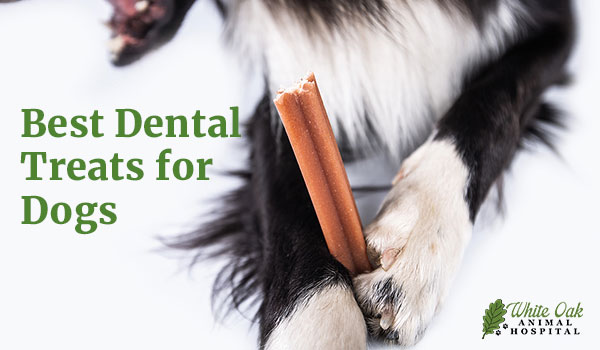
Maintaining proper dental health in dogs is essential for their overall well-being. Without regular care, dogs are at risk of developing dental issues like plaque buildup, tartar, and gum disease. These conditions can lead to discomfort, bad breath, and even more severe health problems, such as heart or kidney disease. While brushing your dog’s teeth is the gold standard for maintaining oral hygiene, it’s not always sufficient or feasible for every pet owner. This is where the best dental treats for dogs come into play.
Dog dental cleaning treats offer a practical, effective solution to enhance oral hygiene. They work by mechanically cleaning the teeth as the dog chews, helping to reduce plaque and tartar buildup. Dental treats are not only convenient but also provide a way to supplement your dog’s oral care routine, especially when brushing isn’t always possible. In this article, we’ll explore the best dental treats for dogs and how they can be incorporated into a comprehensive dental care routine, ensuring your pet’s teeth stay healthy and clean.
Understanding the Role of Dental Treats in Dog Oral Hygiene
While brushing is the most effective way to prevent dental disease, it’s not always easy to brush a dog’s teeth regularly. This is where the best dental treats for dogs can serve as an excellent supplement. They offer a convenient alternative that pet owners can rely on to maintain their dog’s oral health between brushings. However, it’s important to understand that dental treats should not replace regular brushing or professional cleanings; rather, they should be used as part of a broader oral hygiene strategy.
Choosing the best dental treats for dogs involves considering several factors, including the treat’s ingredients, texture, and design. Treats with a rough texture or those that require extended chewing are typically more effective in reducing plaque and tartar. Additionally, treats made from high-quality, safe ingredients ensure that your dog is not only enjoying a tasty snack but also benefiting from a product that supports their health.
How to Choose the Best Dental Treats for Your Dog
Selecting the best dental treats for dogs involves several important considerations. First, the size of the treat should match your dog’s size to prevent choking and ensure that the treat is effective. Smaller dogs need appropriately sized treats that they can chew safely, while larger dogs require bigger treats that will engage them in extended chewing.
Ingredients are another crucial factor. The best dental treats for dogs should be made from high-quality, safe ingredients that are free from harmful additives.
For pet owners looking for a high-quality dental treat that also supports overall health, we recommend the Smiling Dog Dry Roasted Treats for Dogs – Beef Heart (4 pack) available at TCVM Pet Supply. These treats are not only delicious but also provide a natural way to support your dog’s dental health. Made with pure beef heart, these treats are rich in essential nutrients and have a texture that encourages chewing, which helps reduce plaque and tartar buildup. Incorporating these treats into your dog’s dental care routine is a great way to enhance their oral hygiene while offering a nutritious snack they’ll love.
Combining Dental Treats with Other Oral Hygiene Practices
Regular brushing remains the most effective way to remove plaque and prevent tartar buildup. Dental chews and toys can also be used to support oral health by encouraging chewing, which mechanically cleans the teeth. Additionally, regular veterinary check-ups are essential for monitoring your dog’s dental health and catching any potential issues early. By integrating the best dental treats for dogs with these practices, you can provide your pet with a well-rounded dental care routine.
Signs Your Dog Needs More Than Just Dental Treats
Although the best dental treats for dogs are a valuable tool for maintaining oral hygiene, there are times when they may not be enough. Signs that your dog may need additional dental care include bad breath, gum inflammation, and visible tartar buildup. If you notice any of these symptoms, it’s important to seek veterinary advice to address the issue promptly.
Dental treats can help manage minor dental issues, but they cannot replace professional intervention for more serious conditions. Regular veterinary visits allow for professional cleanings and thorough examinations, which are necessary for preventing and treating dental diseases. Understanding the limits of the best dental treats for dogs and recognizing when to seek further care is crucial for maintaining your dog’s overall health.
Incorporating the best dental treats for dogs into your pet’s oral hygiene routine is an effective way to support their dental health. These treats provide a practical solution for reducing plaque and tartar buildup while also offering a tasty reward that dogs enjoy. However, it’s important to remember that dental treats should be part of a broader dental care strategy, which includes regular brushing, professional cleanings, and veterinary check-ups.
Frequently Asked Questions
How often should I give my dog dental treats?
The frequency of giving your dog dental treats depends on the specific treat and your dog’s size. Generally, it’s safe to give your dog a dental treat once a day. However, always follow the manufacturer’s guidelines and consult with your veterinarian to determine the best routine for your dog’s oral health.
Can dental treats replace brushing my dog’s teeth?
No, dental treats cannot replace brushing. While dental treats are effective in reducing plaque and tartar, brushing remains the most thorough method for cleaning all surfaces of your dog’s teeth. Dental treats should be used as a supplement to regular brushing, not a replacement.
Are dental treats safe for all dog breeds and sizes?
Most dental treats are designed to be safe for all breeds and sizes, but it’s important to choose treats that are appropriate for your dog’s size. Always select a treat that is the right size for your dog to prevent choking and ensure effective chewing. Consult with your veterinarian if you’re unsure which treat is best for your dog.